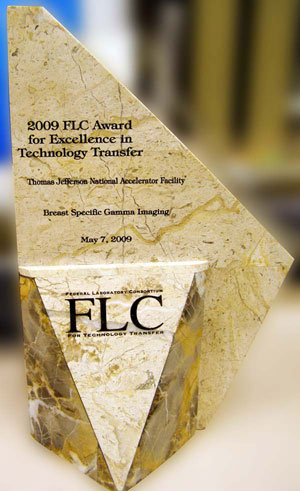 NEWPORT NEWS, VA. – The U.S. Department of Energy’s Thomas Jefferson National Accelerator Facility’s Radiation Detector & Imaging Group, which developed a life-saving compact gamma camera for the improved detection of breast cancer, has been recognized with an award for “excellence in technology transfer” by the Federal Laboratory Consortium for Technology Transfer.
NEWPORT NEWS, VA. – The U.S. Department of Energy’s Thomas Jefferson National Accelerator Facility’s Radiation Detector & Imaging Group, which developed a life-saving compact gamma camera for the improved detection of breast cancer, has been recognized with an award for “excellence in technology transfer” by the Federal Laboratory Consortium for Technology Transfer.
Representatives of the Detector Group received their award during the FLC national meeting held May 7 in Charlotte, NC. The FLC is the nationwide network of federal laboratories that provides the forum to develop strategies and opportunities for linking laboratory mission technologies and expertise with the marketplace.
The Detector Group’s principal role is to research detector solutions and technologies for experimental nuclear physics research at Jefferson Lab. But it also is developing application-specific gamma ray imaging detectors for breast cancer diagnostics and molecular biology medical-oriented research. The medical imaging applications are extensions of detector developments performed for the basic physics program.
The gamma imaging technology developed at the lab was licensed to a high-tech start-up company, Dilon Technologies, Inc. in Newport News, leading to the FLC award. Using the technology, Dilon produces a device known commercially as the Dilon 6800 Gamma Camera.
The Dilon camera uses breast-specific gamma imaging, a molecular imaging technique that has proven to be an effective tool in the differentiation of malignant and benign tumors. Better than its predecessor, scintimammography, BSGI relies on the advanced imaging technology of anatomic-specific detectors to detect early stage cancers. The compact detector developed by Jefferson Lab, under the leadership of then-Detector Group leader Stan Majewski, captures vital tumor information by viewing the metabolism of cancerous lesions in the breast via radiopharmaceutical uptake. Prior to development of this specialized camera, the size and performance of large general purpose gamma cameras used to perform scintimammography and other general nuclear medicine applications, was not well suited to imaging the breast.
“I would like to commend Dr. Drew Weisenberger, Vladimir Popov, Dr. Carl Zorn, Doug Kieper, Dr. Daniela Steinbach, Dr. Stan Majewski, Brian Kross, Dr. Ben Welch and Dr. Randy Wojcik on this prestigious accomplishment,” Virginia Gov. Tim Kaine wrote to members of the Detector Group.
“This honor comes at the recommendation of industry leaders, academics and members of federal state and local governments, and singles out Jefferson Lab as a leader in the field of technology transfer,” the governor continued.
Jefferson Lab is a world-leading nuclear physics research laboratory devoted to the study of the building blocks of matter – quarks and gluons. It is one of 17 DOE national laboratories, and is managed and operated by Jefferson Science Associates, LLC for the DOE’s Office of Science.

